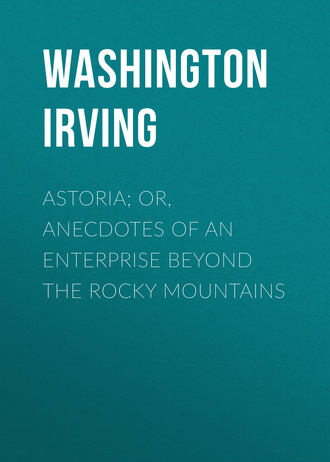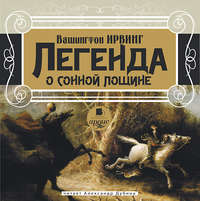 полная версия
полная версияAstoria; Or, Anecdotes of an Enterprise Beyond the Rocky Mountains
“This great trade, carried on by caravans to Santa Fe, annually loads one hundred wagons with merchandise, which is bartered in the northern provinces or Mexico for cash and for beaver furs. The numerous articles excluded as contraband, and the exorbitant duties laid upon all those that are admitted by the Mexican government, present so many obstacles to commerce, that I am well persuaded, that if a post, such as is here suggested, should be established on the Arkansas, it would become the place of deposit, not only for the present trade, but for one infinitely more extended. Here the Mexicans might purchase their supplies, and might well afford to sell them at prices which would silence all competition from any other quarter.
“These two trades, with the Mexicans and the Indians, centring at this post, would give rise to a large village of traders and laborers, and would undoubtedly be hailed, by all that section of country, as a permanent and invaluable advantage. A few pack-horses would carry all the clothing and ammunition necessary for the post during the first year, and two light field-pieces would be all the artillery required for its defense. Afterwards, all the horses required for the use of the establishment might be purchased from the Mexicans at the low price of ten dollars each; and, at the same time, whatever animals might be needed to supply the losses among the dragoons traversing the neighborhood, could be readily procured. The Upper Missouri Indians can furnish horses, at very cheap rates, to any number of the same troops who might be detailed for the defense of the northern frontier; and, in other respects, a very limited outlay of money would suffice to maintain a post in that section of the country.
“From these considerations, and my own personal observations, I am, therefore, disposed to believe that two posts established by the government, one at the mouth of the Yellowstone River, and one on the Arkansas, would completely protect all our people in every section of the great wilderness of the West; while other advantages, at least with regard to one of them, confirm and urge the suggestion. A fort at the mouth of the Yellowstone, garrisoned by fifty men would be perfectly safe. The establishment might be constructed simply with a view to the stores, stables for the dragoons’ horses, and quarters for the regular garrison; the rest being provided with sheds or lodges, erected in the vicinity, for their residence during the winter months.”
1
Carver’s Travels, Introd. b. iii. Philad. 1796.
2
Carver’s Travels, p. 360.
3
On this point Mr. Jefferson’s memory was in error. The proposition alluded to was the one, already mentioned, for the establishment of an American Fur Company in the Atlantic States. The great enterprise beyond the mountains, that was to sweep the shores of the Pacific, originated in the mind of Mr. Astor, and was proposed by him to the government.
4
It appears, from the accounts of subsequent voyagers, that Tamaahmaah afterwards succeeded in his wish of purchasing a large ship. In this he sent a cargo of sandal-wood to Canton, having discovered that the foreign merchants trading with him made large profits on this wood, shipped by them from the islands to the Chinese markets. The ship was manned by natives, but the officers were Englishmen. She accomplished her voyage, and returned in safety to the islands, with the Hawaiian flag floating gloriously in the breeze. The king hastened on board, expecting to find his sandal-wood converted into crapes and damasks, and other rich stuffs of China, but found, to his astonishment, by the legerdemain of traffic, his cargo had all disappeared, and, in place of it, remained a bill of charges amounting to three thousand dollars. It was some time before he could be made to comprehend certain of the most important items of the bill, such as pilotage, anchorage, and custom-house fees; but when he discovered that maritime states in other countries derived large revenues in this manner, to the great cost of the merchant, “Well,” cried he, “then I will have harbor fees also.” He established them accordingly. Pilotage a dollar a foot on the draft of each vessel. Anchorage from sixty to seventy dollars. In this way he greatly increased the royal revenue, and turned his China speculation to account.
5
(Lewis and Clarke, vol. ii. p. 32.)
6
Bradbury, Travels in America, p. 17.
7
Bradbury, p. 110.
8
The distance from St. Louis to Astoria, by the route travelled by Hunt and M’Kenzie, was upwards of thirty-five hundred miles, though in a direct line it does not exceed eighteen hundred.
9
Not quite $40,000 were allowed for furs worth upwards of $100,000. Beaver was valued at two dollars per skin, though worth five dollars. Land otter at fifty cents, though worth five dollars. Sea-otter at twelve dollars, worth from fortyfive to sixty dollars; and for several kinds of furs nothing was allowed. Moreover, the goods and merchandise for the Indian trade ought to have brought three times the amount for which they were sold.
The following estimate has been made of the articles on hand, and the prices:
17,705 lbs. beaver parchment, valued at $2.00 worth $5.00 465 old coat beaver, valued at 1.66 worth 3.50
907 land otter, valued at.50 worth 5.00 68 sea-otter, valued at 12.00 worth 45 to 60.00 30 sea-otter, valued at 5.00 worth 25.00
Nothing was allowed for 179 mink skins, worth each.40 22 raccoon, worth each.40 28 lynx, worth each 2.00 18 fox, worth each 1.00 106 fox, worth each 1.50 71 black bear, worth each 4.00 16 grizzly bear, worth each 10.00
10
An animal called the stoat, a kind of ermine, is said to be found in North America, but very inferior to the European and Asiatic.









